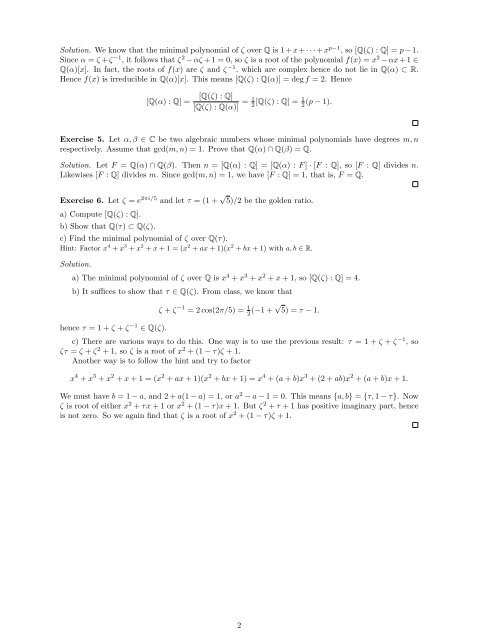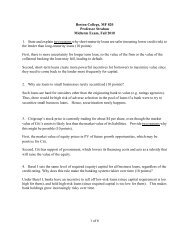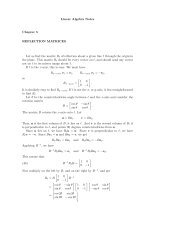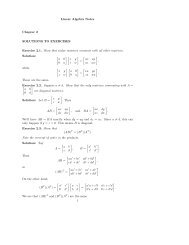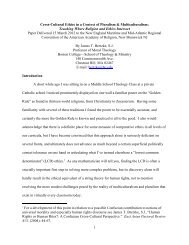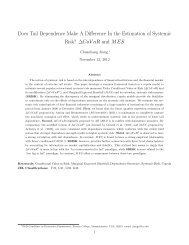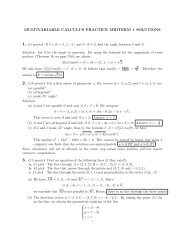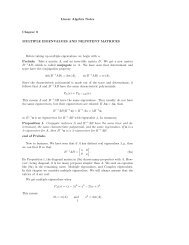MT310 Homework 11
MT310 Homework 11
MT310 Homework 11
Create successful ePaper yourself
Turn your PDF publications into a flip-book with our unique Google optimized e-Paper software.
Solution. We know that the minimal polynomial of ζ over Q is 1 + x + · · · + x p−1 , so [Q(ζ) : Q] = p − 1.<br />
Since α = ζ + ζ −1 , it follows that ζ 2 − αζ + 1 = 0, so ζ is a root of the polynomial f(x) = x 2 − αx + 1 ∈<br />
Q(α)[x]. In fact, the roots of f(x) are ζ and ζ −1 , which are complex hence do not lie in Q(α) ⊂ R.<br />
Hence f(x) is irreducible in Q(α)[x]. This means [Q(ζ) : Q(α)] = deg f = 2. Hence<br />
[Q(α) : Q] =<br />
[Q(ζ) : Q]<br />
[Q(ζ) : Q(α)] = 1 2 [Q(ζ) : Q] = 1 2<br />
(p − 1).<br />
Exercise 5. Let α, β ∈ C be two algebraic numbers whose minimal polynomials have degrees m, n<br />
respectively. Assume that gcd(m, n) = 1. Prove that Q(α) ∩ Q(β) = Q.<br />
Solution. Let F = Q(α) ∩ Q(β). Then n = [Q(α) : Q] = [Q(α) : F ] · [F : Q], so [F : Q] divides n.<br />
Likewises [F : Q] divides m. Since gcd(m, n) = 1, we have [F : Q] = 1, that is, F = Q.<br />
Exercise 6. Let ζ = e 2πi/5 and let τ = (1 + √ 5)/2 be the golden ratio.<br />
a) Compute [Q(ζ) : Q].<br />
b) Show that Q(τ) ⊂ Q(ζ).<br />
c) Find the minimal polynomial of ζ over Q(τ).<br />
Hint: Factor x 4 + x 3 + x 2 + x + 1 = (x 2 + ax + 1)(x 2 + bx + 1) with a, b ∈ R.<br />
Solution.<br />
a) The minimal polynomial of ζ over Q is x 4 + x 3 + x 2 + x + 1, so [Q(ζ) : Q] = 4.<br />
b) It suffices to show that τ ∈ Q(ζ). From class, we know that<br />
hence τ = 1 + ζ + ζ −1 ∈ Q(ζ).<br />
ζ + ζ −1 = 2 cos(2π/5) = 1 2 (−1 + √ 5) = τ − 1.<br />
c) There are various ways to do this. One way is to use the previous result: τ = 1 + ζ + ζ −1 , so<br />
ζτ = ζ + ζ 2 + 1, so ζ is a root of x 2 + (1 − τ)ζ + 1.<br />
Another way is to follow the hint and try to factor<br />
x 4 + x 3 + x 2 + x + 1 = (x 2 + ax + 1)(x 2 + bx + 1) = x 4 + (a + b)x 3 + (2 + ab)x 2 + (a + b)x + 1.<br />
We must have b = 1 − a, and 2 + a(1 − a) = 1, or a 2 − a − 1 = 0. This means {a, b} = {τ, 1 − τ}. Now<br />
ζ is root of either x 2 + τx + 1 or x 2 + (1 − τ)x + 1. But ζ 2 + τ + 1 has positive imaginary part, hence<br />
is not zero. So we again find that ζ is a root of x 2 + (1 − τ)ζ + 1.<br />
2


